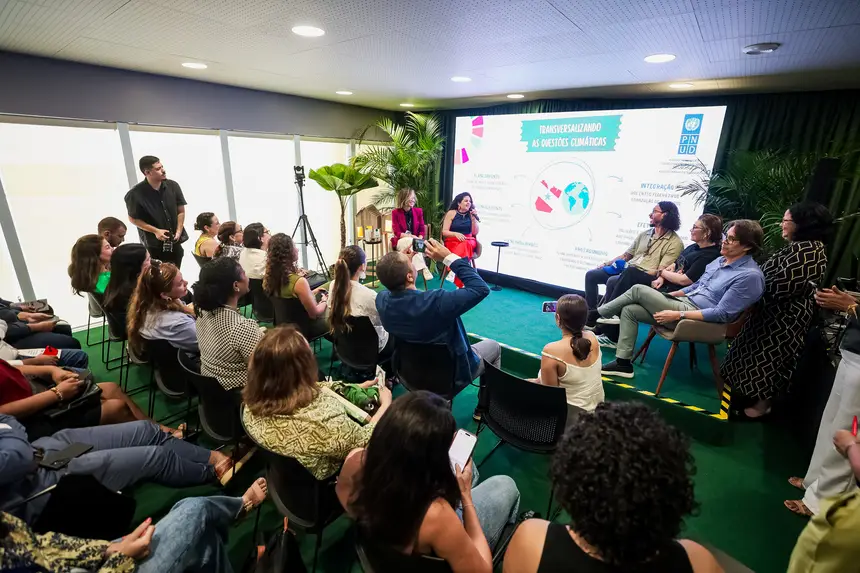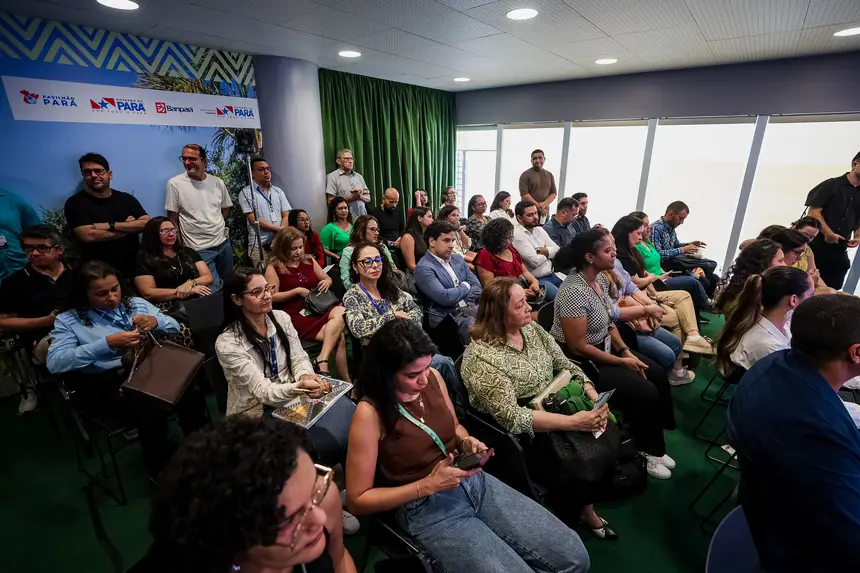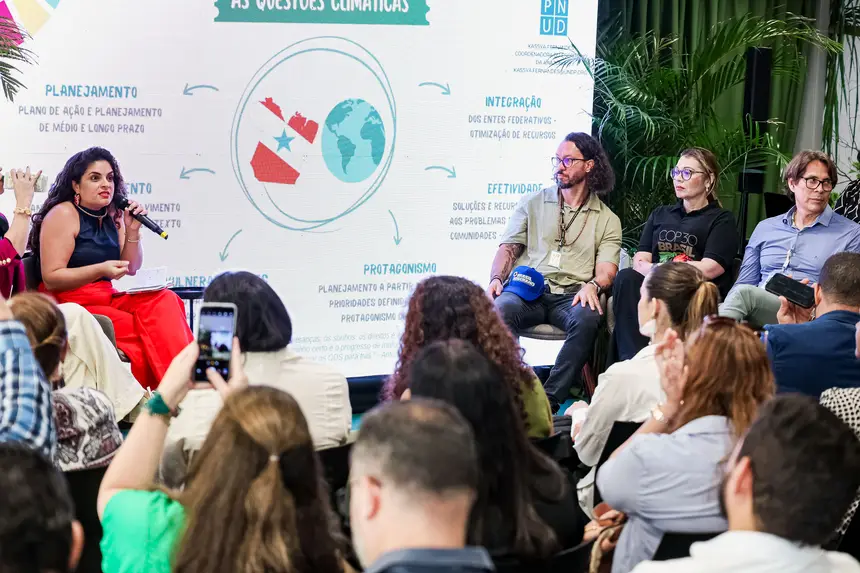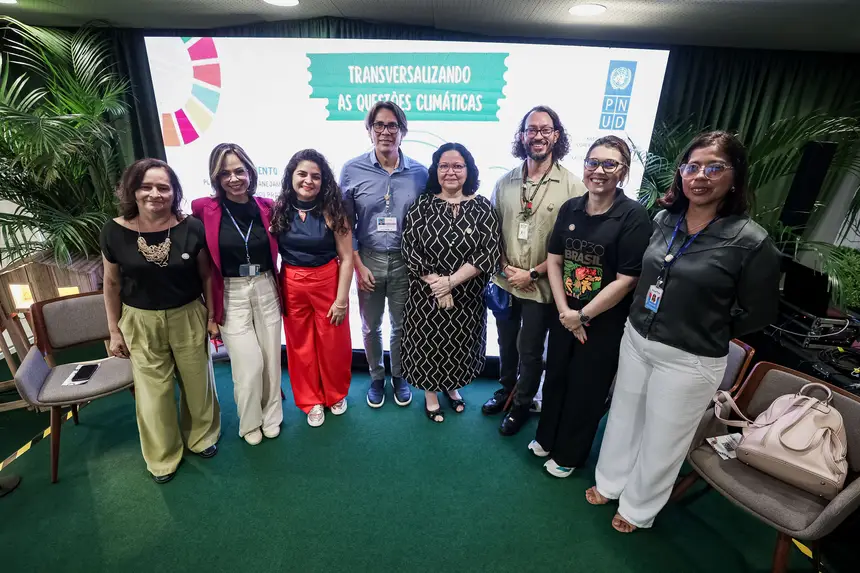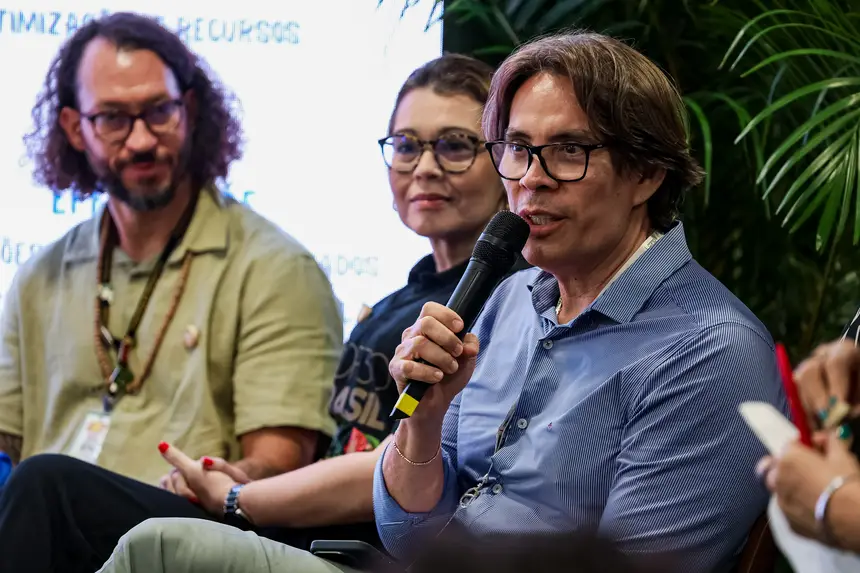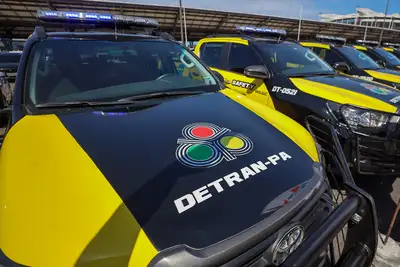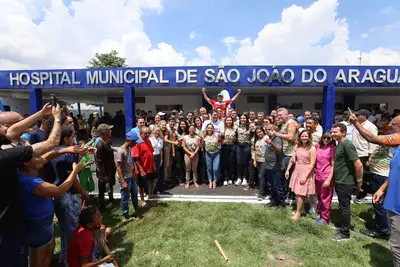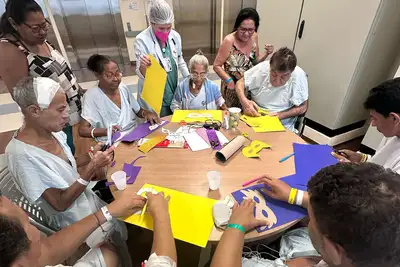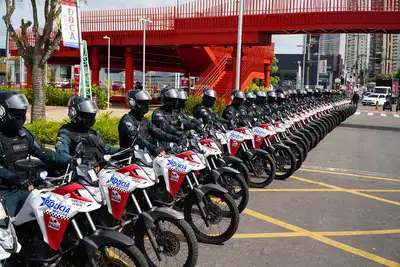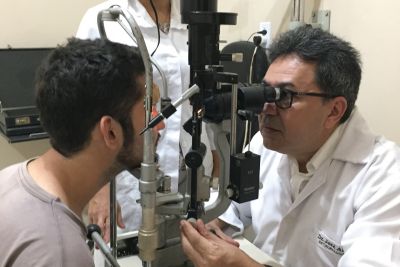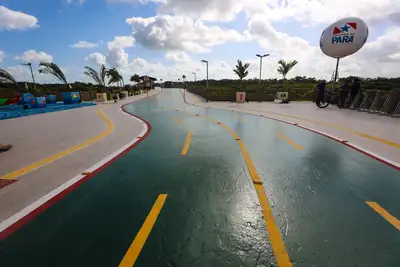Sustainable Planning is the Theme of Seplad Panel at the Green Zone of COP 30
The focus was on how governmental planning can act as a strategic tool in the implementation of public policies aligned with the 2030 Agenda and the SDGs
The Planning and Administration Secretariat (Seplad) presented, this Wednesday (12), the panel "Planning for Sustainable Development: Transversing the Climate Emergency in Public Policies," held at the Pará Pavilion, in the Green Zone of the United Nations Conference on Climate Change (COP 30), in Belém.
The meeting brought together panelists, including representatives from the Government of Pará and invited experts, to discuss how governmental planning can act as a strategic tool in the implementation of public policies aligned with the 2030 Agenda and the Sustainable Development Goals (SDGs).
During the presentation, Seplad highlighted the role of medium and long-term planning in incorporating the climate agenda transversally into governmental actions. The proposal reinforces the commitment of the State of Pará to integrate sustainability into management processes, in order to promote balanced and participatory economic, social, and environmental development.
Ivaldo Ledo, head of Seplad, emphasized the importance of integrating public planning with actions to combat climate change. He also highlighted Pará's leadership in hosting the world's most important climate conference and presented Seplad's initiatives aimed at mainstreaming the sustainable agenda in public policies.
"I am very happy to be here, discussing such an important topic that is entirely linked to the actions developed by our secretariat: the connection between public planning and climate change. This is the third COP I have participated in. In previous editions, Brazil did not have the same opportunity to discuss climate change so broadly, especially considering that they took place in countries with less democratic contexts. Now, hosting COP 30 here in Belém, Pará, in the heart of the Amazon biome, we have a unique opportunity to take the lead in this debate. All our budgetary pieces are linked to a platform that aligns investments with the Sustainable Development Goals (SDGs), allowing for planning that is concretely focused on climate change. Every time we go to build our budgetary instruments, our concern is: how to plan so that every penny invested returns in actions that mitigate the effects of climate change," emphasized Ivaldo.
During the panel, the Executive Coordinator of the National Commission for the Sustainable Development Goals (CNODS), Thiago Gehre Galvão, reinforced the importance of territorializing the 2030 Agenda as an essential strategy for the SDGs to materialize in the territories and directly impact people's lives. He highlighted the role of the Government of Pará and local institutions as examples of articulation between planning, budgeting, and sustainability, also emphasizing the partnership with the United Nations Development Programme (UNDP) in strengthening this agenda.
"We call this strategy of making the SDGs actually reach the territories the 'territorialization of the 2030 Agenda.' And it is important to reinforce: we do nothing alone. Our role is to orchestrate the work of incredible people, like this entire group from Pará, who, with the support of UNDP, have done a beautiful and committed job of placing Pará on the map of sustainable development, with a keen eye on the 2030 Agenda and the SDGs as they should be. It is essential to think from the logic of public planning, budgeting, medium and long term, the PPA, among other instruments. But it is also important to remember: we should not romanticize this agenda. It belongs to Brazil, it belongs to the Brazilian people. It is not just the UN's. The UN played its role by calling countries in 2015, and from that point on, it is up to each nation to decide how to implement it. And we are deciding together, through the work of our Commission," Thiago said.
Another highlight during the panel was the presentation on the Long-Term Strategic Plan of the State of Pará – Pará 2050, which guides the construction of sustainable development in the state from a future vision integrated with the global climate agenda. The plan consolidates the commitment of the Government of Pará to face the climate emergency and transition to a low-carbon economy, acting as a strategic basis for medium and long-term state planning.
"Regarding the structuring of Pará 2050 in the face of changes and the climate emergency, it is important to highlight that the plan is a long-term strategy. Since 2019, the Government of the State of Pará has been treating the environmental agenda as a priority, incorporating it into its planning instruments, such as the two Multiannual Plans (PPAs) of the period, and also in the planning that guides the construction of the future of the State. The plan is aligned with the Sustainable Development Goals (SDGs) and the Race to Zero campaign, which aims to eliminate carbon emissions by 2050. The Climate Emergency is one of the seven transversal themes of Pará 2050. Throughout the listening and participatory construction process with civil society, municipalities, academia, and social actors, a portfolio of structuring projects was developed in the Environmental axis. Among the 79 structuring projects of the plan, seven make up this specific portfolio. These projects are designed uniquely but unfold according to the needs of the 12 integration regions of the State, respecting their territorial specificities. They will serve as a basis for future PPAs of the State and also of the municipalities of Pará, aiming to ensure that by 2050 we can achieve the expected environmental, social, and economic transformation for the people of Pará," explained Socorro Castro, director of Strategic Planning at Seplad.
The coordinator of Policies and Incentives for Bioeconomy at the State Secretariat for Environment, Climate, and Sustainability (Semas), Mariana Oliveira, highlighted the role of Strategic Planning and Environmental Policies of Pará in building sustainable and low-carbon development. The manager emphasized the importance of integrated action between government, the private sector, and civil society in the face of the challenges posed by climate change, presenting the main guidelines of the State Amazon Now Plan (PEAA) and the State's commitment to advance towards carbon neutrality.
"The work with planning in the face of climate change shows that this challenge is not just sectoral; it is not limited to the environment and is not exclusive to the public sector. It is a collective challenge that encompasses all of society. When we talk about climate change, we are necessarily talking about building a new relationship with nature. And this transformation does not happen spontaneously. A strategic look is needed to provoke the necessary change. The State Amazon Now Plan (PEAA) emerges in this context. In 2020, the State launched its climate change policy, precisely at a critical moment of rising deforestation rates, which reinforces the urgency of this historical challenge of combating deforestation in Pará. But it also presents itself as an opportunity to reorient the development of the State. Since then, Pará has proposed to be a carbon-neutral State by 2036. With the update of the PEAA, transforming it into law, this commitment becomes more robust and is now aligned with the national neutrality target by 2030. The fact that COP30 is happening here already demonstrates much of the results that the PEAA has been bringing. There have already been four consecutive years of reduction in deforestation rates," elucidated Mariana.
The coordinator of the United Nations Development Programme (UNDP) office in the Amazon, Kassya Nascimento, emphasized in her speech the importance of involving people directly affected by climate change in the construction of public policies and sustainable development strategies. For her, the true challenge of mainstreaming climate policies lies in balancing economy, memory, and people, without losing sight of the dialogue with those who live the environmental impacts in their daily lives.
"Thinking about mainstreaming is thinking about how we will achieve this balance, which is so difficult, between economy, memory, and people. But there is a fundamental point in all this, which is to discuss with the people — with those who are being affected. Sometimes, we have great ideas within our offices, access to multiple experiences from outside, but it is the affected people who have the capacity to develop the best solutions. So, mainstreaming the climate issue is, above all, involving people. I think our democratic COP shows well the importance of this. And, beyond the discussions, I would like to make an invitation: as you saw in the map presented by Tiago, today we have only eight municipalities with formal adherence to the SDGs. We are subnational actors in this process of sustainable development, and acting this way is the heart of our work. The local UNDP office has 100% Pará soul and heart — and it is with this feeling that we remain committed to supporting the State on the path of sustainable development," Kassya stated.
Integration, sustainability, and planning
Seplad also participated in the panel "Climate Alliances Beyond Borders: How Cities and Companies Co-create Sustainable Futures," also held at the Pará Pavilion, which discussed the importance of cooperation between different sectors in promoting sustainable development.
Geovana Raiol Pires, coordinator of Economic Studies at Seplad, was invited to share Pará's experiences in articulating the 2030 Agenda and the Sustainable Development Goals (SDGs) within the scope of state public policies. Geovana highlighted the history of engagement of the Government of Pará with the 2030 Agenda and the institutionalization of the Sustainable Development Goals (SDGs) in state public policies. According to her, since the first administration, the Government has already presented in its plan the proposal to align public policies with the 2030 Agenda, which was put into practice immediately.
"Our first Multiannual Plan (PPA 2023), which is the largest planning instrument, as well as the others, was entirely aligned with the 2030 Agenda. And this alignment was taken to our public hearings, held in the 12 regions of the State, to present to society the proposal of a structured programming in 17 programs, each linked to the SDGs," she explained.
Geovana also emphasized that the State of Pará recognizes the strong pressure of environmental demands and that, therefore, SDG 13, which addresses action against global climate change, was incorporated transversally. "From this alignment, we triggered a series of actions. In 2020, we launched the Amazon Now Plan, the state climate change policy, and various strategies associated with it," she said.
Among the highlighted advances, the coordinator mentioned the collective CAR, already in execution, which represents an important step in environmental regularization and ensures speed and autonomy to quilombola populations, generating economic opportunities for these groups. She also mentioned Inova Sociobio, a project that allocates about R$ 3.4 billion to strengthen traditional populations through rural credit, training, and encouragement of productive autonomy.


